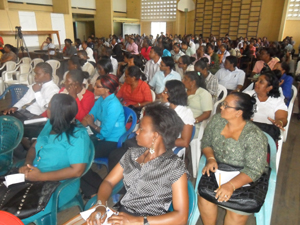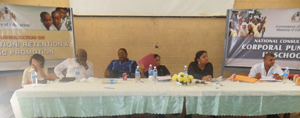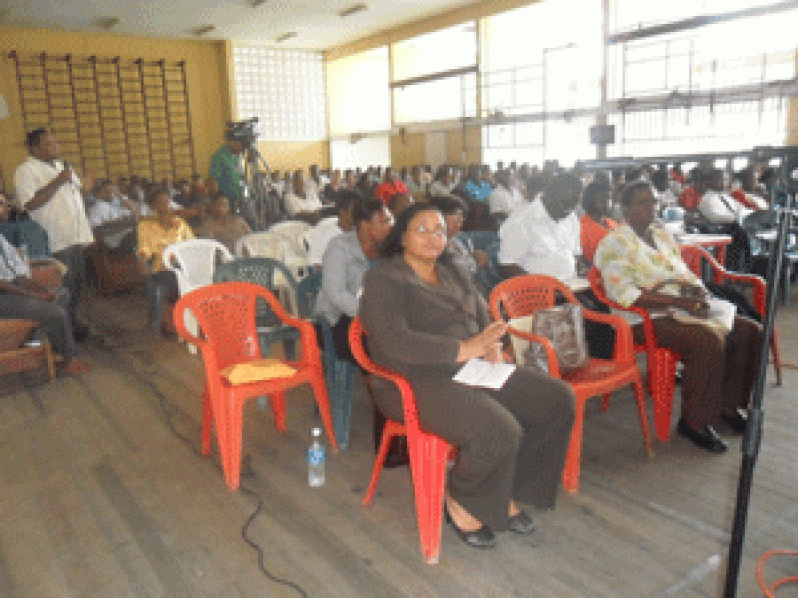…teachers, parents largely pro-punishment and anti-automatic promotion
ALMOST all of the parents and teachers who turned up to interact with Education Minister, Priya Manickchand last Wednesday, in Region 6, called for corporal punishment to remain in the school system, and for automatic promotion to be abolished.  The Government of Guyana, through the ministry, is seeking to understand the preference of teachers and parents with regard to these two issues, and the consultation organised last Wednesday was but the first in a series of others to be held across the country.
The Government of Guyana, through the ministry, is seeking to understand the preference of teachers and parents with regard to these two issues, and the consultation organised last Wednesday was but the first in a series of others to be held across the country.
In Region 6 (East Berbice/Corentyne), at the New Amsterdam Secondary School, formerly known as New Amsterdam Multilateral, hundreds of teachers turned up to voice their concerns .
Many parents from across the region were afforded the opportunity to speak on the issues on Wednesday afternoon. They were encouraged to frankly express their feelings and they did just that.
Ministry’s Policies
Prior to hearing from the audience, Manickchand informed that the policy on grade repetition/retention and automatic promotion was arrived at after extensive research, debate and consultation. The issue only relates to secondary education.
According to Manickchand, a 2006 study on the issue concluded that the application of grade repetition brings extra costs and long-term negative academic and social consequences, has negative effects on achievement, and is associated with social adjustment problems and increased likelihood of school dropout.
Another report found that repeating a grade results in additional administrative expenditure for more students, more classrooms, teachers, educational tools, etc. The low achievement patterns of grade repeaters tend to be associated with poverty indicators at both the school and the family levels.
Furthermore, research further showed that schools in poor areas (especially remote rural areas) often feature short school years, frequent teacher absence, limited supplies, poorly qualified teachers, large classes, multi-age classes, and double shifts.
According to the minister, repetition in Guyana did little to improve student performance. Students were just made to repeat with no additional support and ran a high risk of failure in higher grades. It was directly linked to low self-esteem, increased stress for students, unacceptable student behaviour, alienation from school as a result of being perceived a failure, strained relationships with peers, and a high rate of school drop out. The impact on school operations included over-crowded classrooms, and increased operational costs.
It was directly linked to low self-esteem, increased stress for students, unacceptable student behaviour, alienation from school as a result of being perceived a failure, strained relationships with peers, and a high rate of school drop out. The impact on school operations included over-crowded classrooms, and increased operational costs.
Meanwhile, Manickchand said the ministry’s policy on corporal punishment is that it could only be inflicted by the head teachers, deputy head teachers, or persons delegated by them to do so. There are also specific rules governing the whip used, its size, and the type of offences committed.
Responses to Automatic Promotion
One teacher from J.C. Chandisingh Secondary offered that the repetition programme is not practical for the school system. No penalty for a lazy attitude does nothing to help a student. Parents do not show up for parent/teacher meetings and many of the children are from poor homes. Hence, to help children move on, more has to be done to meet the parents.
Another teacher from the New Amsterdam Secondary said retention gives students much scope for improvement, especially among males. They end up showing “remarkable” improvement when they are asked to go another year. “It (retention) has borne many fruits at our school.” The issue of not having enough cooperation from parents was also raised.
Representing the Lower Corentyne Secondary, one teacher offered that some students are not determined to study because they feel that they will be promoted nevertheless.
A teacher at the Survival Park Nursery observed that children often learn at a different pace and hence some would need more time. Five years in secondary school may not be enough, she said.
Representing the Corentyne Comprehensive High, a teacher pointed out that when students do not meet the criteria for writing the CSEC examination teachers are forced to put them through it.
“They should stay back. It is going to help it and provide a long term good in the end.”
The remedial programme at the end of the school hours is not working, she noted too, as many of the students are out of the gates as soon as 2:30 arrives. She suggested that a snack be provided as incentive for the students to remain for the classes.
Another teacher from the Lower Corentyne Secondary said parents need to come out more and support teachers. She said many of the children do not benefit from proper nutrition at home, which contributes to their lack of interest and slow performance. She suggested giving them practical assistance.
A teacher at Alness Nursery said she also supports retention because some children are seldom in school and their parents are hard to reach. She said children develop the mentality that they do not have to work because they will be promoted anyhow. She suggested more counselling in schools.
Also supporting retention was a teacher from Berbice High who stressed that failure can serve as a form of motivation.
Meanwhile, parents too supported the retention of students. One parent stood up to say that a great injustice was done to the school system when automatic promotion was instituted. He said there is evidence to support that automatic promotion always hurts and hence should be immediately put out of the system.
One student of New Amsterdam Secondary, who carried out a survey in his school before the meeting with the minister, provided the findings and noted that 78% of the students disagreed with automatic promotion. He stressed that the students themselves were not comfortable with it.
Only one parent suggested that keeping a child back could be harmful to him and can do more harm than good. All of the others who stood up to speak were against automatic promotion.
Responses to Corporal Punishment
Teachers offered that this should only be inflicted when there is good reason for doing so. Some reasoned that talking to them and showing them the importance of obedience often works. The whip should only be used in extreme cases, some suggested, noting that “reasoning is more effective” at times.
One teacher said it has been the absence of corporal punishment that results in a total breakdown in the school system. This form of discipline could restore more order in the schools, she observed.
Another teacher expressed that there must be some measure in place to control the future of children and implied that there is not a better and more effective method of disciplining children, if corporal punishment is removed.
Parents too were very much in support of keeping corporal punishment. One said that children develop a lack of respect for teachers when teachers have no authority to ‘beat’ them, and hence feel that they do not have to listen to them. He suggested that corporal punishment be implemented in full force into the school system.
Another parent offered that children simply do not perform well without corporal punishment. Class teachers, she noted, should have the authority to whip, as they would know a child better than the head teachers.
Many of the parents agreed that children should be whipped, but not to the point of abuse.
The student mentioned earlier, who carried out the survey, also did one on corporal punishment and found that 75% of students in his school were against corporal punishment. He relayed other forms of punishment that could be used for the minister to consider.
Manickchand, who was joined by several education officers at the head table, told the teachers and patients that the government does not yet have a position on the two issues and that decisions will be made only after the consultations across the country are complete.



.jpg)








